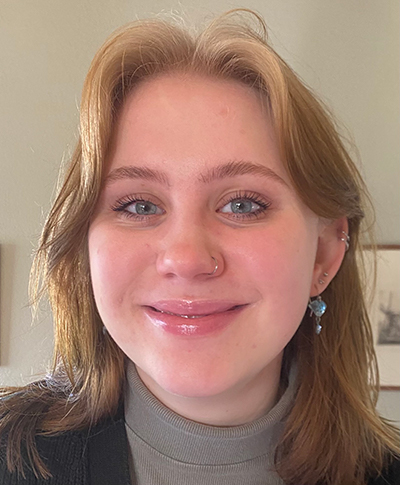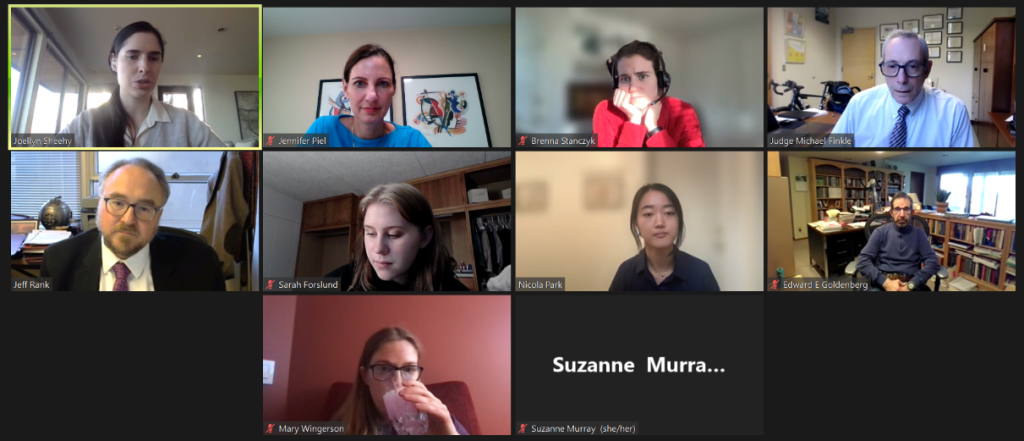MARCH 29, 2023 | CMHPL NEWS
Sarah Forslund, a college freshman, was already confident she wanted to pursue a career in mental health. Growing up in Seattle, her first exposure to the behavioral health field was provided by her psychiatrist father. She later became interested in criminal psychology while watching murder mysteries and true crime shows with her mother.

When Forslund had the opportunity to pick a topic for a month-long immersive learning experience at Oberlin College, she chose forensic mental health, a field that captures the crossover between mental health and the law.
She reached out to Jennifer Piel, MD, JD, a clinical and forensic psychiatrist, director of the Center for Mental Health, Policy, and the Law, and associate professor in the UW Department of Psychiatry & Behavioral Sciences. Over the course of a month, Dr. Piel mentored Forslund and provided a wide range of opportunities to learn about forensic mental health.
“It was important to me that Ms. Forslund gained exposure to many aspects of forensic mental health,” said Dr. Piel. “We discussed correctional mental health, the role of the mental health experts in civil and criminal legal cases, and treatment roles for mental health providers working with persons involved in the criminal legal system. I arranged for Ms. Forslund to meet with local forensic experts and read about others in the field and related fields.”
Forslund learned about ways that the law affects mental health delivery through participation in the legislative process. Dr. Piel chairs the Government Relations Committee for the Washington State Psychiatric Association (WSPA), and Forslund shadowed her to committee meetings, where she met with psychiatrists, psychiatry residents, and lobbyists. Attendees discussed bills before the Washington State Legislature related to behavioral health and decided whether the WSPA would take a public position, testify to the legislature, or ask their constituents to take action.
Forslund also met with Dr. Piel weekly on Zoom. During the call, Forslund would give a presentation to Dr. Piel and other trainees on a bill related to mental health and afterwards they would discuss it, often considering the effects it could have on patients, providers, and the community. “Before this experience, I had never thought about how policy might affect mental health treatment,” Forslund said.
Forslund traveled to Olympia to see the hearings for two bills involving mental health topics and was struck by the diverse perspectives of people who testified. “I learned that legislators often don’t know how to vote on bills unless they hear opinions from experts,” said Forslund. “In our democracy, it’s really important to have communication between citizens and lawmakers. ”
In addition to her exposure to the legislative process, Forslund participated in aspects of the VA Mental Health and Justice Rotation, which is an elective rotation with Dr. Piel for UW psychiatry residents interested in forensic mental health. Forslund attended lectures, a forensic spotlight event, and sat in on a virtual mock court hearing for UW psychiatry residents.

During the mock hearing, residents practiced acting as expert witnesses and were cross examined by a real attorney. In court, psychiatrists may testify as an expert witness to provide their opinion on elements of the case within their expertise. The fictional hearing concerned the liability of a psychiatrist who discharged a patient from a psychiatric hospital. The patient subsequently died by suicide.
“The residents had to think quickly on their feet and it was clear that they were well prepared,” shared Forslund. “It was stressful, even for me watching, because it’s a very intense process.”
“Ms. Forslund was a stand-out student and took the initiative to learn about many aspects of forensic mental health, including the legal regulation of mental health,” Dr. Piel said. “She gained awareness about how bills are made, the process by which courts interpret and apply legislation, and the influence of law on mental health delivery. She also learned about a wide-range of topics in behavioral health, including assisted outpatient treatment, the competency to stand trial process, and scope of practice.”
The experience opened Forslund’s eyes to new career paths to explore. She realized she may want to support people who have been incarcerated with their transition back into the community. “The month of working with Dr. Piel made me think more about law, so I’m taking a couple of politics classes this semester. I don’t know if it’ll be medical school or law school in my future… or neither. Maybe I’ll go into social work.”
Interested in learning about legislative advocacy and forensic psychiatry training in residency and fellowship programs? Read Dr. Piel’s article in The Journal of the American Academy of Psychiatry and the Law.